I had the pleasure of participating in France 24’s panel discussion program, The World This Week, last Friday. The other panelists were the IHT’s Anne Bagamery, AFP’s Dave Clark and RTL 4’s Stefan de Vries. Topics included the EU debt crisis agreement, Tunisia’s elections and the emergence of democratic Islamism in the aftermath of the Arab Spring, and the end of NATO’s mission in Libya. Part one can be found here. Part two can be found here. It was a fun and informative discussion. I was especially surprised to learn from Stefan, who was in Brussels covering the EU summit, […]
Africa Archive
Free Newsletter
Tuareg fighters who fought for former Libyan leader Moammar Gadhafi were reported earlier this month to have returned to Mali to start a new rebel group. In an email interview, Baz Lecocq, professor of history at Ghent University, discussed Tuareg rebel groups. WPR: What are the main Tuareg rebel groups, and what are their main objectives? Baz Lecocq: Beginning with the start of decolonization in the 1950s, groups of Tuareg have protested, violently or otherwise, about their inclusion in Africa’s newly independent states, especially in Mali and Niger. In the 1990s, Tuareg in Mali and Niger engaged in protracted guerrilla […]
While no fewer than 80 political parties participated, Hizb Ennahda, a once-banned Islamist party, has emerged as the major winner in Tunisia’s first election since the ouster early this year of President Zine El Abidine Ben Ali. Ennahda’s dominance — winning roughly 43 percent of the seats in Tunisia’s new Constituent Assembly — can best be explained by what Christopher Alexander, a leading Tunisia scholar and political scientist at Davidson College in North Carolina, calls the “cultural authenticity vote.” Alexander told Trend Lines on Wednesday that “there are Tunisians who frankly are not that religious, but supported Ennahda because they […]
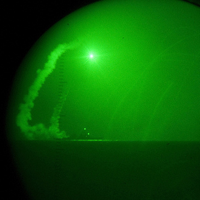
The battle to define the lessons of the Western intervention in Libya began almost as soon as the first Tomahawk missiles started hitting that country’s air defense network back in March. Many of the arguments have focused on the viability of the “Responsibility to Protect” doctrine of international humanitarian intervention and how it might apply to such countries as Bahrain or Syria. However, defense analysts also subjected the military character of the campaign to scrutiny, with some now suggesting the fight in Libya indicates that airpower has finally fulfilled its decisive promise, having matured to the extent that it can […]
Last month, South Africa unveiled the first-ever military plane to be designed and produced by an African country. In an email interview, John Dunne a specialist in defense economics at the Bristol Business School, discussed South Africa’s arms industry. WPR: What is the recent trajectory and current state of South Africa’s domestic arms industry? John Dunne: South Africa’s arms industry has been through considerable change since the end of apartheid rule. After serving as a comprehensive system supporting the apartheid state, it was allowed to decline under the post-apartheid government, with the state procurement and production entity Armscor being split […]
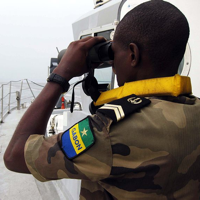
West Africa is rapidly becoming a major player in the global trade in illegal drugs and a central focus of the efforts to control it. Escalating arrests of West African drug traffickers at foreign airports, container shipments of cocaine seized off the West African coast and the collapse of entire African states under pressure from global drug cartels are some of the images used by international drug-control experts and the media to illustrate West Africa’s growing role in the trade in heroin and cocaine during the past decade. International experts claim that after having played an insignificant role in the […]
The deployment of 100 U.S. troops to advise in the fight against Central Africa’s Lord’s Resistance Army has triggered speculation about the precise role such troops will play and the extent to which they may engage in combat without express congressional approval. It’s generally agreed the troops are Special Forces sent to help Ugandan and Congolese soldiers gather intelligence and coordinate logistics. But questions remain about how far they’ll go toward using more robust U.S. capabilities, like UAV drones, to potentially take down the LRA’s notoriously violent leader, Joseph Kony. “A possible scenario,” according to Geoffrey Corn, a former military […]
Senegal’s president is facing the most serious political unrest of his career just months before seeking re-election to a third term. This report produced by the U.S. government-run Voice of America examines the movement aligned against him with particular focus on a group of young Senegalese musicians and journalists called “Y’en A Marre” or “We’ve Had Enough”.
Earlier this month, Brazil sent 300 troops to join UNIFIL, the U.N. peacekeeping force in Lebanon. In an email interview, Kai Michael Kenkel, a professor at the Institute of International Relations at the Pontifical Catholic University of Rio de Janeiro, discussed Brazil’s peacekeeping operations. WPR: What is the history of Brazil’s involvement in international peacekeeping missions? Kai Michael Kenkel: Brazil is a strong supporter of the U.N. and started participating very early in U.N. peace operations, notably the U.N. Special Committee on the Balkans in 1947 and the U.N. Emergency Force (UNEF) in 1956 following the Suez crisis, which was […]
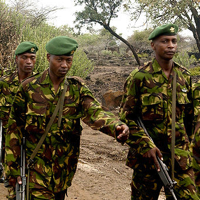
LAMU, Kenya — Supported by military planes and helicopters, Kenyan tanks, military trucks and columns of troops streamed across the Somali border Sunday in coordination with Somali government soldiers. Initially reported by locals, the operation was soon confirmed by Kenyan government spokesmen. The mobilization comes in the wake of a spate of kidnappings along Kenya’s vast, porous border with Somalia that prompted the Kenyan government Saturday to effectively declare war on al-Qaida-linked Al-Shabaab militants. Delivering a joint statement with the country’s top security chiefs, Internal Security Minister George Saitoti vowed to pursue the group in both rural and urban areas. […]
Liberians have gone to the polls in large numbers for the second presidential election held since the nation was gripped by civil war. The country’s election commission says results are due Thursday in the contest pitting Nobel Peace Prize recipient and incumbent Ellen Johnson Sirleaf against former diplomat Winston Tubman.
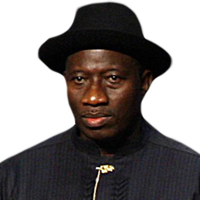
PORT HARCOURT, Nigeria — On Oct. 2, Nigeria celebrated the 51st anniversary of its freedom from British rule. A large gala was planned in Abuja, the fast-growing Nigerian capital located in the center of the country. But, days before the celebrations, Boko Haram, a Muslim extremist group based in the country’s north, and the Movement to Emancipate the Niger Delta (MEND), based in the country’s oil-rich south, both threatened to disrupt the festivities with violence. Boko Haram had already made it clear that it was capable of attacking Abuja on Aug. 26, when it exploded a bomb at the United […]
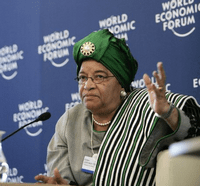
MONROVIA, Liberia — In her 2006 inauguration speech, with Liberia still reeling from civil wars that had lasted from 1989 to 2003 and killed more than 250,000 people, President Ellen Johnson-Sirleaf referred to a greeting children here use when their fathers return home from work — or, as is common in Liberia, from trying to find it: “Papa na come.” “Well, too many times, for too many families, Papa comes home with nothing,” said Johnson-Sirleaf, Africa’s first elected female head of state. “We will work to ensure that when our children say ‘Papa na come,’ Papa will come home joyfully […]
